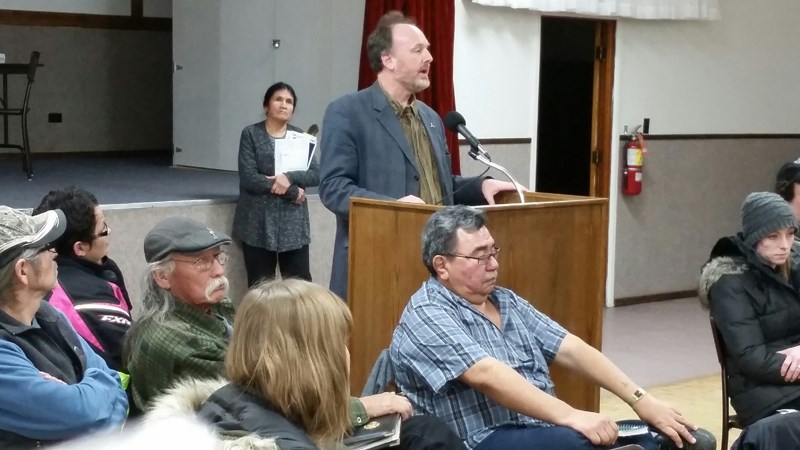As an engineer touted the safety of potentially hauling radioactive waste to Creighton, one observer wondered how that is relevant given First Nations opposition to the concept.
Mark Bigland-Pritchard, an applied physicist, stood up during question period at last week’s meeting of the Community Liaison Committee (CLC), which is studying the idea of nuclear waste storage.
He said the organization searching for a place to store the waste, the Nuclear Waste Management Organization (NWMO), has been clear that a host site will be chosen only if surrounding First Nations approve.
Bigland-Pritchard said the site under review just outside Creighton is Crown land within treaty territory.
Two of the three First Nations with traditional claims on that territory – Peter Ballantyne Cree Nation and Opaskwayak Cree Nation – want no part of nuclear waste, he said.
“In what sense is it possible to work in partnership to implement this proposal?” Bigland-Pritchard, a Saskatoon resident, asked CLC and NWMO officials. “In other words, why are you still here?”
NWMO spokesperson Mike Krizanc said while Peter Ballantyne has passed a resolution against nuclear waste storage, there are people within the band who “have expressed interest in learning.”
Before Krizanc could finish his sentence, Eileen Linklater, a band councillor with Peter Ballantyne, interrupted him.
“Don’t say Peter Ballantyne are interested,” Linklater said. “We’re not interested…in this nuclear waste.”
Tense moments
It was one of several tense moments during the Nov. 20 CLC meeting, held at the Creighton Community Hall with NWMO engineer Chris Hatton as guest speaker.
Hatton, in charge of designing equipment to transport the spent nuclear fuel rods, said the movement of the material will be governed by international regulations.
Stressing safety as top priority, Hatton said that in the decades such material has been transported on earth, not once has an accident resulted in a breached container.
The large stainless steel transport containers used to move the waste, Hatton said, are designed and tested to withstand falls, fires and immersion in water.
Addressing nearly 40 members of the public, he said only a “small amount” of radiation comes off the containers.
An individual would receive a higher dose of radiation from eating a banana, Hatton said, than from a nuclear waste transport truck going past his or her door each day.
His comments weren’t enough to stop concerned Creighton resident Keely Patterson from asking what protocols and cleanup procedures exist in the event that one of the transport containers is in fact damaged.
Hatton said such a protocol has not been established in Canada, unlike in other parts of the world where the emergency procedure calls for cordoning off the impacted area and summoning a cleanup team.
He said movement of spent fuel rods in Canada will begin in 2035 at the earliest, so there is ample time to ensure an adequate transportation system.
Disclosure
D’Arcy Hande of Saskatoon took to the podium to ask about the disclosure of any NWMO-funded salaries of individuals working for the Town of Creighton.
That topic is of particular interest to Hande, a journalist for the alternative newsmagazine Briarpatch. One of his articles claimed an individual working for the Northern Village of Pinehouse, once considered for nuclear waste storage, was being paid to promote NWMO’s agenda.
Krizanc, the NWMO spokesperson, said the organization offers funding to municipalities for a part-time employee.
The employee’s role, he said, is to liaison with NWMO, ensuring local taxpayers do not bear the costs of their community’s involvement in the process.
Krizanc said financial information around these payments is publicly available.
Valerie Zink, a former Briarpatch editor, came to the meeting armed with several claims of her own.
Zink said $40,000 went from NWMO to Pinehouse to encourage village council to make its vision statement more amenable to nuclear waste storage.
She asked whether the Town of Creighton is also revising its vision statement.
Krizanc said he didn’t agree with the premise of Zink’s question, but he acknowledged NWMO will provide funding to a community to develop a vision statement.
He said communities that accept the funding are instructed not to consider nuclear waste when formulating their vision statements.
Once the statement is complete, Krizanc said, a community can see whether waste storage is a good fit.
When Zink repeated her initial question, town administrator Paula Muench said Creighton does not have a vision statement but, with the help of a consultant, is in the process of creating one.
Final say
Another concern came from Katie Anderson, a local resident, who said she was told Creighton voters, not the region as a whole, would have the final say on whether radioactive waste comes to the area.
But Krizanc stressed the project will require “ a partnership between a host, neighbouring communities and surrounding Aboriginal” communities.
“What that looks like is not up to the NWMO to determine, but it is up to the community and the region to decide,” he added.
At one point Greg Linklater asked what would happen if Saskatchewan and Manitoba adopted laws banning the movement of nuclear waste within their borders.
Hatton, the NWMO engineer, replied that under federal law, neither provinces nor communities have the power to bar the transport of goods on their roads.
Earlier in the meeting, another area resident, Wayne Elliot, stressed the need for “responsible action” in terms of the radioactive material.
“My guiding spirit tells me to support a geological underground [repository] wherever a suitable, safe site is identified,” Elliot said.
Opponent invited
Shortly after hearing from Elliot, CLC members decided to invite nuclear power opponent Dr. Gordon Edwards speak at a future meeting.
Several members of the public have suggested Edwards as a guest speaker. NWMO has offered to pay travel expenses and an honorarium to Edwards and other speakers invited by the CLC.
CLC member Buz Trevor agreed there is a demand to hear Edwards, but he wanted assurances that Edwards would speak only about nuclear waste storage, not the separate issue of nuclear power.




